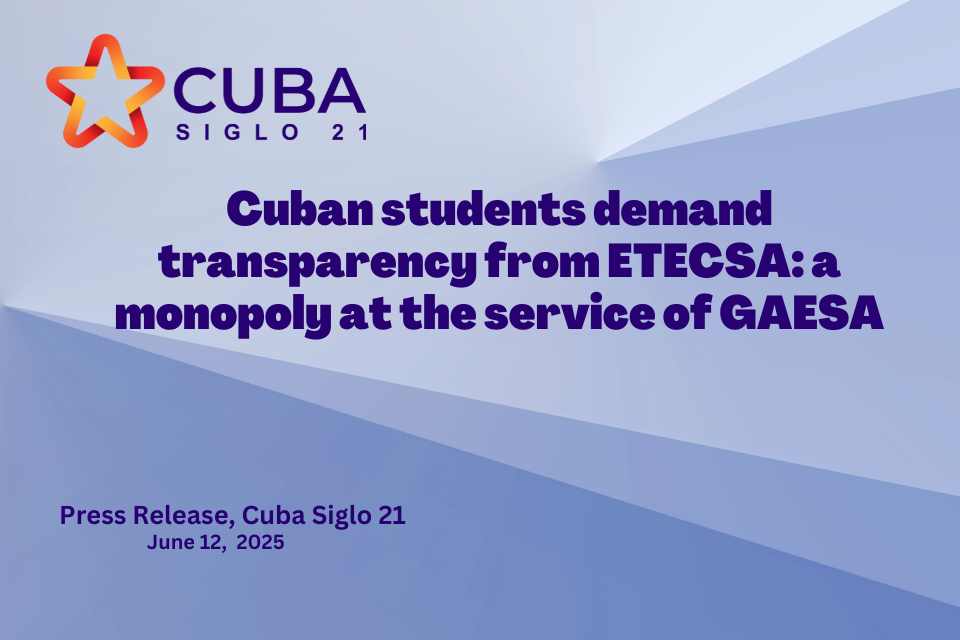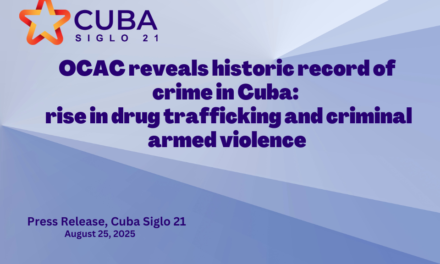Descargar informe completo
Download Complete Report in English
Listado de Empresas relacionadas con GAESA
Summary in English
A recent Dossier published by Cuba Siglo 21, ¡Transparency!: Cuban students against the mafia state“ exposes the essence behind the current student conflict that has spread to universities across the island. What began as an economic conflict between a company and its clients, has acquired, unintentionally by its protagonists, an eminently political essence with this demand. The demand for transparency, if satisfied, would expose the model of privatized exploitation of national resources that the Cuban power elite has built -without any auditing- in the last decades.
The report strongly denounces ETECSA, Cuba’s monopoly telecommunications company, as one of the exploitative mechanisms of the machinery of the super conglomerate GAESA. The increase in tariffs has provoked deep political unrest inside and in the diaspora outside the island, publicly expressed by the outbreak of student protests that have multiplied in Cuban universities demanding that they be revoked, as well as demanding economic justice and the right of citizens to access the accounts of this institution.
According to the report, ETECSA lacks resources not because of an external “blockade”, but because of the voracity of GAESA, its real majority shareholder, which diverts the multimillionaire revenues of that company – mainly coming from the Cuban exile – to subsidize the surveillance infrastructure of the repressive state and to finance tourist investments out of citizen control. “ETECSA is not a socialist state enterprise of the Cuban people, as the official discourse proclaims. It is a monopoly operated by a mafia elite that uses its revenues with absolute impunity,” says Emilio Morales, author of the Dossier.
The historical irony could not be more poignant: in 1960, Fidel Castro justified the nationalization of the Cuban Telephone and Telegraph Company as an act of popular sovereignty against that foreign ITT monopoly, when today, six decades later, the Cuban people continue to be exploited by another monopoly -GAESA- whose real owners remain hidden behind a network of corporations registered in tax havens as anonymous societies.
The recent tariffs imposed by ETECSA, which have provoked protests throughout the country, were not a decision of its directors, but a direct imposition by GAESA, motivated by the fall of its income in other areas such as tourism and remittances. It is, the report assures, a measure designed to squeeze even more the population and the Cuban diaspora, which sustains from abroad the basic communication services -as well as food and medical needs- inside the island.
The investigation also reveals that ETECSA subsidizes thousands of telephone lines of state institutions of the repressive apparatus (MININT, FAR, PCC, etc.) free of charge, using as a source of financing the telephone recharges paid by emigrants. Thus, citizens on the island and the diaspora pay not only for their right to communicate, but also for the instruments that allow the totalitarian state to exercise its surveillance over them.
The report ends with a clear warning: the students have ignited a spark that will not be easily extinguished. What began as a protest against an abusive tariff has evolved, step by step, into a growing national awareness of the mafia-like nature of real political and economic power in Cuba. “The scenario has changed forever. Today, Cubans are starting to understand that they do not live under a simple authoritarian system, but under a kleptocratic oligarchy that enriches itself at the expense of their poverty. That, almost certainly, will have consequences.”
In this context, the demand for transparency becomes a deeply subversive act. It is not just a matter of opening ETECSA’s accounts to public scrutiny, but of unmasking the entire business system under GAESA’s control, which operates without audit, without institutional control and without accountability to the people. The report includes a list of the dozens of companies that associated or linked in different ways to GAESA constitute the backbone of its financial empire.
“You will know the truth, and the truth will set you free”, concludes the report, appealing to a citizenry that awakens in the heat of these student protests not only to demand access to GAESA’s economic and financial information that the State refuses to audit, but also to reaffirm its right to recover control over the national resources that GAESA has been appropriating which legitimately belong to the citizenry.







